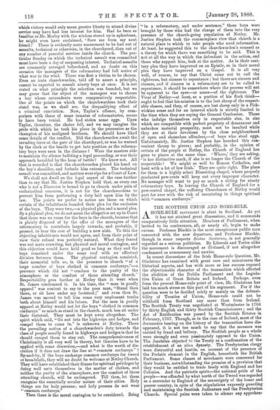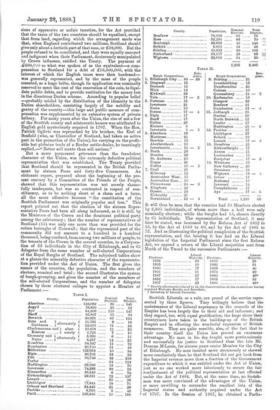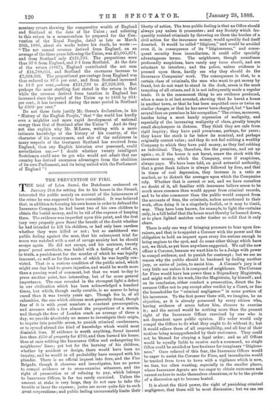THE SCOTTISH UNION AND HOME-RULE.
AHOME-RULE movement is afoot in Scotland. As yet it has not attained great dimensions, and it commands comparatively little attention. Members of Parliament, when invited to its conferences, all, or nearly all, begin to make excuse. Professor Blackie is the most conspicuous public man connected with the new departure. and Professor Blackie, though in some respects Scotus Scotorum, is not generally regarded as a serious politician. By Liberals and Tories alike the movement is discouraged as ill-timed, if not altogether condemned as unnecessary and unwise.
In recent discussions of the Irish Home-rule Question, Mr. Gladstone has examined with great care and minuteness the historical aspects, and has with more or less success exposed the objectionable character of the transaction which effected the abolition of the Dublin Parliament and the Legisla- tive Union of Great Britain and Ireland. Perhaps, even from the present Home-rule point of view, Mr. Gladstone has laid too much stress on this part of his argument. For if the question were to be decided solely or mainly on the defensi- bility of Treaties of Union, Home-rule could not be withheld from Scotland any more than from Ireland. The Scottish Treaty was negotiated at Westminster in 1706 by thirty English and thirty Scottish Commissioners ; and the Act of Ratification was passed by the Scottish Estates in February, 1707. Though, as in the case of Ireland, most of the documents bearing on the history of the transaction have dis- appeared, it is not too much to say that the measure was carried by fraud and bribery. The Scottish people as a whole were strongly and even passionately opposed to the Union. The Jacobites objected to the Treaty as a confirmation of the establishment of an alien dynasty. The Presbyterian clergy were distrustful and hostile, on account of the presence of the Prelatic element in the English, henceforth the British Parliament. Some classes of merchants were concerned for their business, notwithstanding the promise of a provision that they would be entitled to trade freely with England and her Colonies. And the patriotic spirit—the national pride of the people—was offended by what north of the Tweed was regarded as a surrender to England of the sovereignty of the lesser and poorer country, in spite of the stipulations expressly guarding and maintaining the Scottish Judicature and the Presbyterian Church. Special pains were taken to silence any apprehen- sions of oppressive or unfair taxation, for the Act provided that the taxes of the two countries should be equalised, eacept that from land, regarding which the arrangement made was that, when England contributed two millions Scotland should give only about a fortieth part of that sum, or f:48,000. But the people refused to be conciliated, and they were equally annoyed and indignant when their Parliament, dexterously manipulated by Crown influence, ratified the Treaty. The payment of £400,000 as what was spoken of as the equivalent-a com- pensation to Scotland for a debt of £16,000,000, with the interest of which the English taxes were then burdened- was generally represented, and by the mass of the people resented, as a huge bribe, though its application was nominally reserved to meet the cost of the renovation of the coin, to liqui- date public debts, and to provide restitution for the money lost in the disastrous Darien scheme. According to popular belief -probably misled by the distribution of the idemnity to the Darien shareholders, consisting largely of the nobility and gentry of the country-this large and public measure of com- pensation was supplemented by an extensive system of private bribery. For many years after the Union, the rise of not a few of the Scottish county and aristocratic houses was attributed to English gold mysteriously acquired in 1707. When the Hon. Patrick Ogilvie was reproached by his brother, the Earl of &afield (who, as Chancellor of Scotland, had taken an active part in the promotion of the Union), for carrying on the profit- able but plebeian trade of a Border cattle-dealer, he tauntingly replied,-" Better sell nowte than sell nations."
But a more permanent grievance than the fraudulent character of the Union, was the extremely defective political representation that was established. The Treaty provided that Scotland should be represented in the British Parlia- ment by sixteen Peers and forty-five Commoners. An elaborate report, prepared about the beginning of the pre- sent century by a Committee of the Friends of the People, showed that this representation was not merely shame- fully inadequate, but was so contracted in respect of con- stituency, as to be nothing short of a sham and a farce, all the more offensive because "the constitution of the Scottish Parliament was originally popular and free." This report pointed out that the election of the sixteen Repre- sentative Peers had been all along influenced, as it is still, by the Ministers of the Crown and the dominant political party among the aristocracy ; that the number of representatives of Scotland (45) was only one more than was provided for the rotten boroughs of Cornwall ; that the represented part of the community did not amount to a hundred in a hundred thousand, being confined, from among two millions of people, to the tenants of the Crown in the several counties, to a Corpora- tion of 33 individuals in the City of Edinburgh, and to 65 delegates from the same number of self-elected Corporations of the Royal Burghs of Scotland. The subjoined tables show at a glance the miserably defective character of the representa- tion provided under the Act of Union. The first gives the names of the counties, the population, and the numbers of electors, nominal and total ; the second illustrates the system of burgh-grouping, and gives the number of the members of the self-elected Corporations, and the number of delegates chosen by these electoral colleges to appoint a Member of Parliament :-
TABLE I.
County.
Aberdeen poptilatim
123,082
ENloecmtionrsal.
96 ... ..
EiTectotaorls.
145 Argyll
21 52 Ayr 8476:503806 119 147 Banff 35,807 15 ...... 34 Berwick 30,621 87 124 Bate and 11,791 9 18 Caithness ... I alternately [ 22,609 11 24 Clackmannan and 1 alter- j" 10,858 11 23 Kinross , nately ( 6,725 7 16 CraraartY and I alternately [ Nairn 5,390 8,257 6 14 11 25 Damfries 54,547 11 72 Dambarton 20,710 51 43 Midlothian 122,954 10 34 Elgin 26,705 58 33 Fife 93,743 32 216 Forfar ... 24 114 Haddington 29,986 13 76 Inverness 74,292 83 55 Kincardine 26,349 6 74 Kirkcudbright ...... 29,211 72 137 Lanark
69 98 Linlithgow 17,844 18 71 Orkney and Shetland 24,445 21 29 Peebles ... ... 8,735
Perth 126,366 19 184
County. Population. Nominal Electors. Total Electors.
Renfrew 78,058 82 78
Ross 52,291 83
70 .s.
Roxburgh 33,682 49 143 ,., Selkirk 5,070 13 38
Stirling 50,825 30 103 1 Sutherland 23,117 23 26
Wigtown 23,918 34 50 . 1
1,235 2,405
TABLE II.
Dole-
Burgh Corporations. gates.
1. Edinburgh City 33 - 83 2. Dingwall 15 Dornoch 15 Wick 12 Kirkwall 23 Tain 17- 5 3. Fortrose 15 Inverness 21 Nairn 19 Ferree 17 - 4 4. Elgin 17
Burgh Corporations.
9. Stirling Inverkeithing Damfermline Calross Qneensferry 10. Rutherglen Glasgow Renfrew Dumbarton 11. Jedburgh Dunbar ......
Dale- gales.
21 15 26 19 21 - 5 19 32 21 15 - 4 25 20 Banff 17 North Berwick... 12 Cullen 26 Lander 17 Kintore 9 Haddington 25 - 5 Invernrie 9 - 5 12. Peebles 17 5. Aberdeen 19 Linlithgow 27 Montrose 21 Selkirk 33 Brachia 13 Lanark 17 - 4 Aberbrothock 19 13. Dumfries 25 Inverbervie 15 - 5 Kirkcudbright ... 17 6. Perth 26 Annan 21 Dundee 29 Lochmaben 15 St. Andrews 29 Sanquhar 17 - Cupar 31 14. Whithorn ...... 19 Forfar 19 - 5 New Galloway ... 20 7. Crail 21 Stranraer ...... 18 Kilrenny 13 Wigtown ...... 18 - 4 Anstrather West.. 15 15. Irvine 17 Anstruther East... 19 Rothesay 19 Pittenweem 24 - 5 Inverary 13 8. Kinghorn 22 Campbeltown ... 17 Dysart 24 Ayr 17- 5 Kirkcaldy 21
Total 1,220 65 Barntisland 22 - 4
It will thus be seen that the counties had 30 Members elected by 2,405 individuals, of whom more than a half were only nominally electors ; while the burghs had 15, chosen directly by 65 individuals. The representation of Scotland, it may here be stated, was increased by the Refoim Act of 1832 to 53, by the Act of 1868 to 60, and by the Act of 1885 to 72. And as illustrating the political complexion of the Scottish representation, and the bearing it has had on the Liberal legislation of the Imperial Parliament since the first Reform Act, we append a return of the Liberal majorities sent from North of the Tweed to the successive Parliaments :-
Liberal Liberal Elections. Majority. Elections. Majority.
1832 29 1859 25 1835 19 1866 31 1836 17 1868 46 1841. 11 1874 20 1847 19 1880 46* 1852 17 1885 52 1857 23 1886 48t
• Shortly afterwards reduced to 42, the Conservatives at the re-elections having regained VVigtown Burghs and Buteshire. t Including 17 Liberal Unionists.
Scottish Liberals, as a rule, are proud of the service repre- sented by these figures. They willingly believe that the maintenance of the Liberal supremacy in the councils of the Empire has been largely due to their aid and influence ; and they regard, too, with equal gratification, the large share their countrymen have taken in the building-up of the British Empire and in effecting the wonderful expansion of British commerce. They are quite sensible, also, of the fact that to their country itself the Union has proved an enormous advantage. No man in his day fought more pertinaciously and successfully for justice to Scotland than the late Mr. Duncan M'Laren, for sixteen years senior Member for the City of Edinburgh. No man insisted more strenuously or showed more conclusively than he that Scotland did not get back from the Imperial revenue more than a fraction of the Government expenditure to which it was entitled under the Act of Union, just as no one worked more laboriously to secure the fair readjustment of the political representation at last effected under the Act of 1884. Bat, at the same time, no Scotch- man was more convinced of the advantages of the Union, or more unwilling to surrender the smallest iota of the Imperial status and authority acquired under the Act of 1707. In the Session of 1867, he obtained a Parlia- mentary return showing the comparative wealth of England and Scotland at the date of the Union ; and referring to this return in a memorandum he prepared for the Con- vention of the Royal Burghs, dated as late as March 20th, 1886, about six weeks before his death, he wrote :— " The net annual revenue derived from England, on an average of the three years following the Union, was £5,005,874, and from Scotland only £121,793. The proportions were thus 97-6 from England, and 2-4 from Scotland. At the date of the return (1867), England contributed the net sum of £41,788,051, and Scotland the enormous increase to £7,928,303. The proportional per-centage from England was thus reduced to 87-5 per cent., and from Scotland increased to 14.3 per cent.,—from £121,793 to £7,928,303. But perhaps the most startling fact stated in the return is that while the revenue derived from taxation in England has increased since the period of the Union up to 1866 by 834. per cent., it has increased during the same period in Scotland by 6509. per cent."
Do not these facts justify Mr. Green's declaration, in his "History of the English People," that "the world has hardly seen a mightier and more rapid development of national energy than that of Scotland after the Union "i And do they not also explain why Mr. M‘Laren, writing with a more intimate knowledge of the history of his country, of the character of his countrymen, and also of the unfairness in many respects of the treatment Scotland has received from England, than any English historian ever possessed, could nevertheless say,—" I doubt whether twenty intelligent Scotchmen could now be got who would not admit that our country has derived enormous advantages from the abolition of its own Parliament, and its being united with the Parliament of England"?




















































 Previous page
Previous page